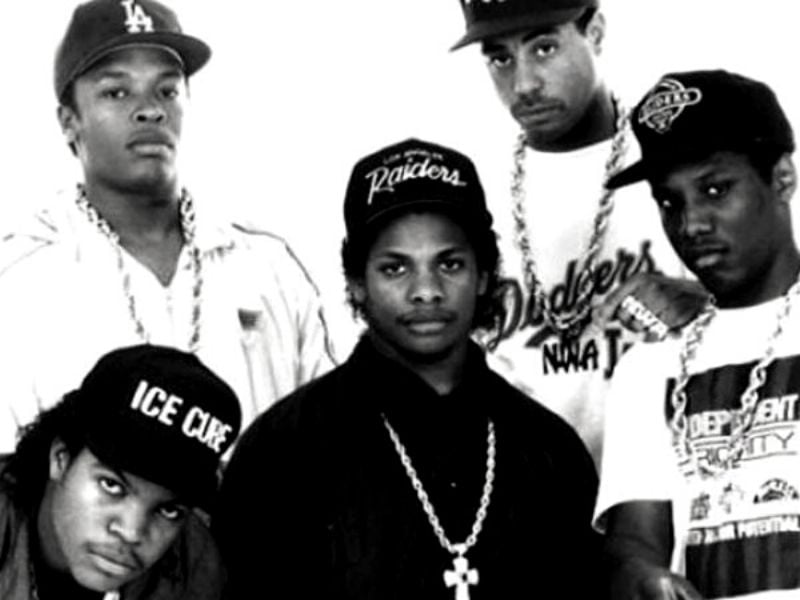In the annals of music history, few albums have left an indelible mark on culture quite like NWA‘s 1988 release, Straight Outta Compton. This revolutionary album, with its raw and unapologetic portrayal of the reality faced by African Americans in the heart of Compton, California, not only transformed the hip-hop genre but also sparked a seismic shift in societal conversations about race, police brutality, and freedom of expression.
Before delving into the profound influence of Straight Outta Compton, it’s essential to understand the socio-political landscape of the time. The late 1980s were a period of socio-economic struggle for marginalised communities, particularly in places like Compton. Rampant poverty, drugs, gang violence, and a tense relationship with law enforcement created an environment where artistic expression served as a powerful means of catharsis and social commentary.
Musically, the record transformed the hip-hop landscape. NWA, consisting of members Eazy-E, Dr. Dre, Ice Cube, MC Ren, and DJ Yella, introduced a new style of rap that was marked by its stark authenticity and uncompromising lyrics. The album’s beats were gritty and intense, underpinning the group’s candid tales of life in Compton. This departure from the more lighthearted and party-oriented rap of the time laid the foundation for gangsta rap, a sub-genre that would continue to evolve and influence artists for years to come.
The album’s standout tracks, including the title track ‘Straight Outta Compton,’ ‘Gangsta Gangsta,’ and ‘Express Yourself,’ carried a palpable anger and frustration that resonated deeply with the experiences of African American youth. This authenticity, rooted in the artists’ firsthand experiences, struck a chord with listeners and drew them into the harsh realities faced by the residents of Compton.
Beyond its musical innovation, Straight Outta Compton was a fearless social commentary. The album did not shy away from addressing systemic racism, police brutality, and the fraught relationship between the black community and law enforcement. Tracks like ‘Fuck tha Police’ were direct responses to the harassment and violence that many black individuals faced at the hands of law enforcement. While controversial, the song became an anthem for those who felt voiceless in the face of oppression, sparking discussions about the role of music in amplifying social issues.
The album also tackled issues of gang violence, poverty, and the cycle of despair that gripped Compton. Tracks like ‘Dopeman’ and ‘Compton’s N the House’ shed light on the realities of drug addiction and economic struggle, giving listeners an unfiltered glimpse into the world that NWA members had grown up in.
The album’s blunt language and explicit content attracted widespread attention, including controversy. The FBI even sent a letter to NWA’s record label expressing their concern about the lyrics of ‘Fuck tha Police.’ The controversy surrounding the album raised questions about freedom of expression and the fine line between artistic license and responsibility. Straight Outta Compton highlighted the power of music to challenge norms and provoke discourse, even in the face of censorship attempts.
The legacy of Straight Outta Compton is one that continues to shape music, culture, and activism. The album opened doors for artists to address issues that were previously swept under the rug. Its influence can be heard in subsequent generations of hip-hop artists who use their platforms to shed light on social injustices and promote change. From Tupac Shakur to Kendrick Lamar, the impact of NWA’s unfiltered storytelling can be felt in the very fabric of hip-hop’s evolution.
Beyond the music industry, the record played a pivotal role in fostering discussions about race, inequality, and systemic issues. The album catalysed conversations that would ultimately contribute to the larger dialogue surrounding racial justice, leading to changes in policies, attitudes, and perceptions.
The seismic impact of NWA’s album Straight Outta Compton is undeniable. It redefined the boundaries of hip-hop, challenged the status quo, and ignited vital conversations about social and racial injustices. By combining raw musical talent with unflinching social commentary, NWA created an album that not only entertained but also inspired change. As we reflect on the album’s enduring legacy, we are reminded of the power of art to incite revolutions, transcend barriers, and leave an indelible mark on society.
